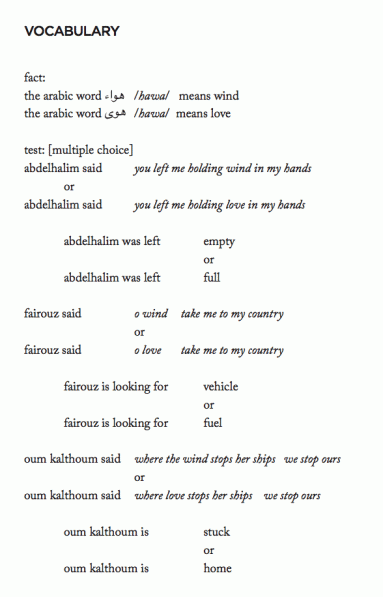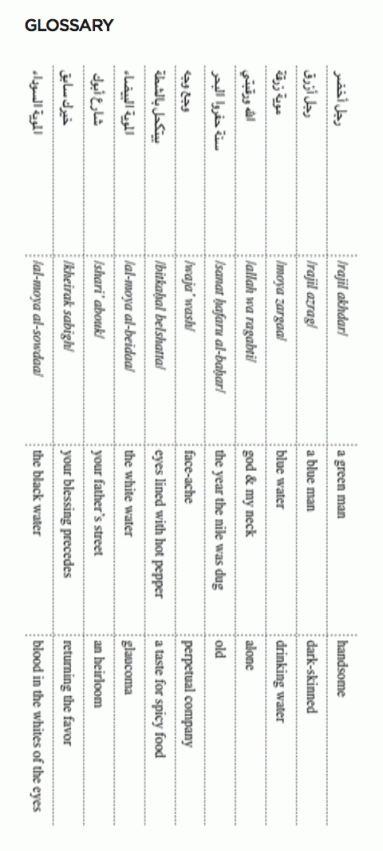I am writing this—I am starting this writing—while sitting in the International Lounge of the hospital. It’s business comfortable, and it reminds me of the international students’ office in which I spent much of my undergrad—an assortment of flags, accents, body vernaculars, anxieties, hopes. Official translators help patients navigate hospital bureaucracy, trying to translate the most difficult of sentences—it’s terminal, you have months left, prepare yourself, it will take a long time, you will need to be on medication for the rest of your life, your loved one will need care forever—into feeling and understanding. Translation is this impossible necessity.
*
Translation is at the heart of Safia Elhillo’s Asmarani, a work that moves between how words are written and how words sound, as in the first poem, “Vocabulary”:

* *
Translation is also the relationship between script and knowledge—I do not know how to write Arabic, so I must use a screenshot. I cannot reproduce Elhillo’s intricate spacing on the page—not without difficult, so I must use a screenshot. An argument emerges about the screenshot and translation, the screenshot as the impossibility of translation, and the poetry page as the site of untranslatable motion.
One watches Elhillo move wind/love into empty/full, vehicle/fuel, stuck/home, and wonders about how winds get stuck and how love turns into home. These impossibly necessary transformations.
*
Almost 4 months into my stay in India, I track the words that stamp my thinking:
blood, bloodwork, transfusion, chemotherapy, radiotherapy, waiting, delay, tests, tests, tests, doctor, patient, bed, bloodwork, infusion, appointment, waiting, delay, tests, bathroom, bowel movement, injection, fefol, cisplatin, domstal, looz, generic, branded, injection, bed, bowel movement, bowel movement, bowel movement, diarrhoea, constipation, blood, bloodwork, blood, bloodwork, blood, bloodwork, blood, bloodwork, blood, bloodwork, blood, bloodwork
*
bloodwork :: kinship
bloodwork :: wake work
bloodwork :: disposability
bloodwork :: carework
*
I read Elhillo’s untitled poem, reproduced in full
did our mothers invent loneliness or did it make them our mothers were we fathered by silence or just looking to explain away this quiet is it wasteful to pray for our brothers in a language they never learned whose daughters are we if we grow old before our mothers or for their sakes they called our grandfathers the january children lined up by the colonizer & assigned birth years by height there is no answer we come from men who do not know when they were born & women shown to them in photographs whose children left the country & tried for romance & had daughters full of all the wrong language
Elhillo’s poems speak to themselves, and about themselves, recognising their own limits: “daughters full of all the wrong language” might write of “men who do not know when they were born.” A question is posed of how time is reckoned, of how time is valued: from the ethnohistories I know best, birth is reckoned by time of day or time of year (this name means born at night, that name means born in the rainy season, that name means born after a drought, this name means born in the year of plenty), and age is reckoned by association (belonging to the age group of locusts, belonging to the age group of beauty, belonging to the age group of helicopters).
When one is born and how one is named narrates a story. Not always. Never always.
When one is “full of all the wrong language,” one does not know how to hear, how to ask, how to measure.
*
I belong to those who are re-learning how to measure, struggling to collect knowledge from failing memories, trying to listen to those we once tried to unhear, and failing.
*
bloodwork
*
bloodwork because I am writing this in the wake of multiple deaths—three men tortured and murdered in Kenya, two women killed in the U.S., two men killed in the U.S., and a 4-year-old girl trying to comfort her mother
bloodwork: how to translate across spaces, how to ask if we can meet on grounds other than shared sorrow
*
i do not always survive
across boundaries
—“First Interview for the Position of Abdelhalim Hafez’s Girl”
*
I am reading Dagmawi Woubshet’s Calendar of Loss, a meditation on mourning and AIDS that devotes significant attention to black gay cultural production. It is flavoring how I read and misread and unread Elhillo.
I am in the register of the elegy. And this, I confess, is probably unfair to her work.
*
We shall not always mourn feels like an impossible promise—bloodwork.
*
“Glossary”

*
There are moments—too many to name—when bloodwork makes a kind of reading impossible. I feel I cannot do justice to Elhillo’s book, to the intricate work it enacts. And for that I am sorry.
Poetry speaks when we cannot.
*
“I do not always survive
across boundaries”
*
bloodwork
